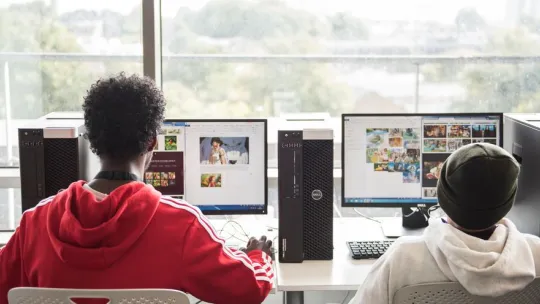Key information
Publication type: General
Publication date:
Contents
5 sections
1. Introduction
This brief highlights the employment experiences of Bangladeshi and Pakistani women in London; and their implications for national efforts to reduce economic inactivity. It draws on the 2025 report Bangladeshi and Pakistani Women in Good Work, commissioned by the Greater London Authority (GLA) and led by the National Institute for Economic and Social Research (NIESR), in collaboration with seven community researchers.
1.1 Background
Despite improved educational outcomes, driven by second and third generation-individuals and highly skilled migrants, Bangladeshi and Pakistani women face disproportionately high economic inactivity and unemployment, and persistent gender and ethnicity pay gaps.
Key employment barriers for these women include limited access to professional networks and training, visa restrictions and unrecognised qualifications. Many report inadequate support from Jobcentre Plus, discrimination, exclusionary workplace cultures, few progression opportunities, and limited access to flexible work and childcare.
1.2 Policy context
Recent national policy developments have shifted the wider employment landscape. The Get Britain Working white paper aims to reduce economic inactivity through reforms to Jobcentre Plus; improved support for health-related barriers; expanded childcare access; and targeted investment in young people, disabled individuals, and local communities.
The Make Work Pay initiative proposes reforms to employment law – including stronger protections against sexual harassment, and expanded equal pay rights for racially minoritised and disabled workers. The government is also consulting on mandatory ethnicity and disability pay gap reporting for large employers.
In May 2025, the UK government released the white paper Restoring Control over the Immigration System, proposing reforms to the immigration system. These include increased restrictions on skilled worker visas, raised English language requirements, and a longer path to permanent residence. These proposals could significantly impact Bangladeshi and Pakistani migrant women and London businesses.
1.3 Significance
The Get Britain Working strategy presents an opportunity to fully address how race, gender and health intersect to influence economic inactivity. The recommendations from this brief aim to ensure that national policy better meets the needs of Bangladeshi and Pakistani women – delivering broader benefits for other women and racially minoritised groups across the UK.
2. Recommendations
The following recommendations are made to ensure that national plans to tackle economic inactivity, and boost employment, are inclusive of Bangladeshi and Pakistani women. They also benefit other groups facing similar barriers to secure employment.
-
Develop a national training programme for Jobcentre Plus staff in intercultural competency; and build community partnerships to deliver tailored employment advice.
The Department for Work and Pensions (DWP) should ensure that Jobcentre Plus advisers are trained in intercultural competency to provide culturally sensitive, tailored employment support – especially in highly diverse areas such as London.
In areas with large Bangladeshi and Pakistani populations, Jobcentre Plus should consider partnering with local faith and community organisations to deliver employment services in trusted spaces and build stronger community relationships. Local authorities can play a key role in facilitating and sustaining these partnerships.
- Increase provision of culturally sensitive, affordable childcare.
To support workforce participation of Bangladeshi and Pakistani women, and build trust among mothers from diverse backgrounds, childcare must be accessible, affordable and culturally appropriate. The Department for Education (DfE) should embed cultural diversity training into existing early years frameworks for childminders, and for group-based and school-based providers. This would help align childcare provision with the parenting practices of diverse families.
Childcare services should be located in areas with high Bangladeshi and Pakistani populations. The local authorities should work with mosques, schools and community groups to raise awareness and improve access.
- Support women re-entering the workforce through targeted programmes, apprenticeships and training.
The DWP should introduce targeted programmes, apprenticeships and training for women at different life stages – especially migrant women with unrecognised qualifications; those returning from career breaks; and those seeking to change careers due to concerns about inclusivity.
These initiatives should include English-language support, UK-based work experience, and flexible learning options to help Bangladeshi and Pakistani women re-enter and thrive in the workplace.
- Make local Get Britain Working plans more inclusive of those with protected characteristics.
Efforts to reduce economic inactivity must include employer-led change to succeed. Local Get Britain Working plans should actively support employers to adopt inclusive hiring and retention practices, and establish a culture of inclusivity. This includes monitoring and reporting on gender, ethnicity and disability pay gaps; addressing workplace discrimination; and creating progression pathways for Bangladeshi and Pakistani women, particularly in areas with large Bangladeshi and Pakistani populations.
The GLA is committed to working with the government to create a diverse talent pipeline for employers. It will do so through the development of an Inclusive Talent Strategy that helps every Londoner into good work, progress their career and grow the economy.
- Devolve skills and employment budgets to local level via mayoral authorities.
Coordinated, flexible and employer-led skills and employment services are essential to support those facing the greatest barriers to good work. Devolving skills and employment budgets to a local level, via mayoral authorities, would enable joined-up working and allocation of funding to communities that need it most.
Local authorities, community groups, education providers and employers should collaborate to connect senior leaders with Bangladeshi and Pakistani women and promote outreach, training (including ESOL) and internships. These partnerships help raise awareness of available career paths, and help women to build the skills needed to access them.
- Develop a process for recognising and translating international qualifications in the UK labour market.
The UK National Information Centre (UK ENIC) helps employers recognise international qualifications, supporting fairer hiring for migrants. To improve access, the DfE and the DWP should raise awareness of UK ENIC among employers and migrant communities, including Bangladeshi and Pakistani women.
Jobcentre Plus staff should be trained on supporting jobseekers who could benefit from UK ENIC services and available financial support to cover application costs – especially for low-income or unemployed migrants. For example, the discretionary Flexible Support Fund helps to cover the cost of qualification recognition, but is currently underused.
- Mitigate the intersectional impact of immigration reforms on migrant women’s employment.
Proposed immigration reforms should recognise migrants’ vital role in sectors experiencing staff shortages, such as the NHS, social care and hospitality. To boost economic growth and meet workforce demands, targeted policies should support skills development and reduce barriers for businesses to employ migrant women, increasing Bangladeshi and Pakistani women’s participation and progression in the UK labour market.
3. Acknowledgements
The Workforce Integration Network of the GLA commissioned the National Institute of Economic and Social Research (NIESR) to produce this policy briefing. This briefing was authored by Dr. Domiziana Turcatti, Senior Social Researcher at NIESR; and Postdoctoral Affiliate to the Centre on Migration, Policy, and Society (COMPAS) and the School of Anthropology and Museum Ethnography at the University of Oxford. Special thanks to Dr Anisa Butt (NIESR) for her contribution to the development of the recommendations in this briefing. This briefing has been co-developed with the GLA.
Copyright
Greater London Authority
August 2025
Published by
Greater London Authority
City Hall
Kamal Chunchie Way
London E16 1ZE
enquiries 020 7983 4000
minicom 020 7983 4458
Photographs ©
Bibliography
DfE (2024a). Early years foundation stage statutory framework for group and school-based providers. https://assets.publishing.service.gov.uk/media/670fa42a30536cb92748328f/EYFS_statutory_framework_for_group_and_school_-_based_providers.pdf
DfE (2024b). Early years foundation stage statutory framework for childminders. https://assets.publishing.service.gov.uk/media/670f8c0f366f494ab2e7b93d/EYFS_statutory__framework_for_childminders.pdf
DWP (2024). Flexible Support Fund. https://data.parliament.uk/DepositedPapers/Files/DEP2024-0442/067._Flexible_Support_Fund_V30.0.pdf
GLA (2018). Inclusive London: The Mayor’s equality, diversity and inclusion strategy. https://www.london.gov.uk/programmes-strategies/communities-and-social-justice/mayors-strategy-equality-diversity-and-inclusion
Turcatti, D., Stockland, K., and project team members (2025). Bangladeshi and Pakistani women in good work: Barriers to entry and progression. NIESR. https://niesr.ac.uk/projects/bangladeshi-and-pakistani-women-good-work-barriers-entry-and-progression
UK government. (2024a). Get Britain Working White Paper. GOV.UK. https://www.gov.uk/government/publications/get-britain-working-white-paper/get-britain-working-white-paper
UK government. (2024b). Next steps to make work pay. GOV.UK. https://assets.publishing.service.gov.uk/media/6707a5eb92bb81fcdbe7b62b/next_steps_to_make_work_pay.pdf
UK government. (2025). Restoring Control over the Immigration System White Paper. GOV.UK. https://www.gov.uk/government/publications/restoring-control-over-the-immigration-system-white-paper

